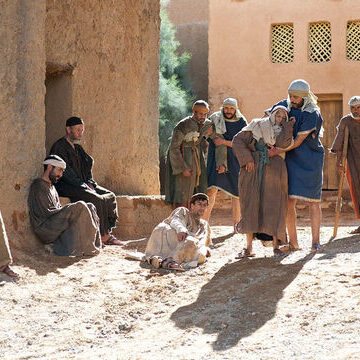Th e Bible ncludes many lengthy speeches, sermons, and prayers. Already at the beginning of Deuteronomy, we find Moses delivering a long but beautiful address reminding the Israelites of God’s goodness while on their journey to the land of Canaan. The lessons in that speech are tremendous. Joshua chapters 23 and 24 record Joshua’s famous “but as for me and my household, we will serve the Lord” farewell address, which offered sound advice to the next generation. Peter preached a powerful sermon on Pentecost. In Acts chapter 2, he testified about the Christ he knew personally. In Acts chapter 7, Stephen chided the Sanhedrin as he took them on a 53-verse historical journey of God’s grace. And we would be remiss not to mention our Savior’s beautiful Sermon on the Mount in Matthew chapters 5-7, by far the most famous sermon ever preached.
e Bible ncludes many lengthy speeches, sermons, and prayers. Already at the beginning of Deuteronomy, we find Moses delivering a long but beautiful address reminding the Israelites of God’s goodness while on their journey to the land of Canaan. The lessons in that speech are tremendous. Joshua chapters 23 and 24 record Joshua’s famous “but as for me and my household, we will serve the Lord” farewell address, which offered sound advice to the next generation. Peter preached a powerful sermon on Pentecost. In Acts chapter 2, he testified about the Christ he knew personally. In Acts chapter 7, Stephen chided the Sanhedrin as he took them on a 53-verse historical journey of God’s grace. And we would be remiss not to mention our Savior’s beautiful Sermon on the Mount in Matthew chapters 5-7, by far the most famous sermon ever preached.
Let’s visit another famous speech. The significance of this speech isn’t in its content but rather its presentation. Meet Eutychus, a young man whose name meant “fortunate,” and fortunate he was. We know nothing of his background. We don=t know anything about his parents, friends, hobbies, or goals. We don’t even know if he was wealthy or poor, shy or bold. In fact, Eutychus didn’t speak in his own story. Then why was he there? Perhaps it was because we can find a little bit of Eutychus in ourselves. Perhaps we’ve all found ourselves in similar embarrassing situations.
The apostle Paul was on his way to Jerusalem for a final visit, but first he stopped in the city of Troas to meet with his fellow Christians. Paul had much to tell them and very little time to do it. The believers gathered in the third floor room of a house that may have belonged to one of them or may have been rented for this important occasion. Acts tells us that Paul “spoke to the people and, because he intended to leave the next day, kept on talking until midnight” (20:7). Knowing that “there were many lamps in the upstairs room where they were meeting” (20:8), the night air was likely thick with smoke and humidity.
Eutychus was one of those in the audience. He dearly wanted to hear what Paul had to say. Eutychus sat comfortably on the window ledge and continued to listen to the great missionary.
As time went by, Eutychus’ eyes began to grow heavy. Perhaps his head bobbed up and down as he slowly drifted off to another place. And another place is exactly where they found him. In a moment, Eutychus was no longer comfortably seated in the window. He was dead on the ground. Eutychus had drifted off and fallen right out of the third-story window. What was he thinking? Perhaps not much at the time. More important, what were the rest of the people thinking? “Has anyone seen Eutychus?” “Did you hear a thump outside?” “You don’t really think Eutychus . . .?”
Paul hurried down the stairs to the pavement below, where the body of Eutychus lay. Paul “threw himself on the young man and put his arms around him” (20:10). Soon new life ran through his veins. Eutychus was alive again. Paul not only put Eutychus to sleep, but he awakened him as well. The people took Eutychus upstairs, fed him some bread, and let him rest through the remainder of the night (but perhaps not on the window seat). Paul continued preaching until morning.
Might there be a little Eutychus in all of us? Aren’t we fortunate that we have safe church benches on which to doze off when the spirit becomes too weak and the flesh becomes just too willing?
Prayer thought: Give thanks to God for the blessing of freedom to worship.
